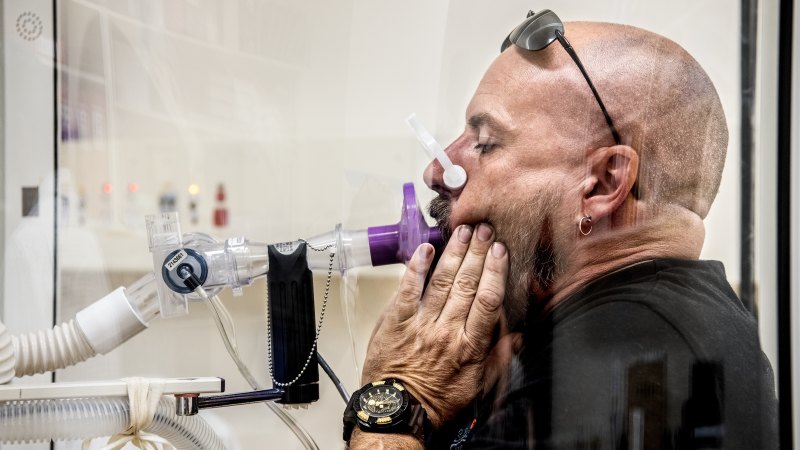Caesarstone launches advertising blitz over potential benchtop ban

Save articles for later
Add articles to your saved list and come back to them any time.
A global manufacturer of engineered stone has launched an advertising blitz against a blanket ban on the product, claiming such a move could increase the risk of silicosis, as federal and state governments keep a key Safe Work report under wraps.
Caesarstone is warning of the economic and health effects of prohibiting the engineered stone commonly used in kitchen benchtops and responsible for a silicosis epidemic among tradies as it pushes instead for a ban on manufactured stone with a crystalline silica concentration above 40 per cent.
Ken Parker, a silicosis sufferer who was cutting 40 benchtops a day before he was diagnosed, undergoes a lung function test. Credit: Steven Siewert
“Caesarstone’s primary concern is that a wholesale ban is unnecessary, excessive and, most importantly, will not solve the devastating issue of silicosis,” the company’s Australian managing director, David Cullen, wrote in a letter to Workplace Relations Minister Tony Burke ahead of a radio, print and social media campaign.
“We believe such action may actually increase risks for workers, who will continue to handle types of stone containing levels of harmful silica higher – sometimes significantly – than the engineered stone products now available.”
A joint investigation by The Sydney Morning Herald, The Age and 60 Minutes revealed workers exposed to silica dust were battling the debilitating symptoms of the lung disease silicosis while state-based regulators failed to effectively police workplaces to guard against the dangers associated with inhaling the dust generated from cutting engineered stone.
Graeme Edwards, a former member of the national dust diseases taskforce and a Royal College of Physicians fellow, said Caesarstone’s argument “doesn’t make sense”.
“The engineered stone clearly is associated with a much higher risk than other crystalline silica-containing products and the industry and regulators have demonstrated a failure to protect workers using engineered stone,” he said.
“The regulators have had every opportunity to implement a tighter licensing scheme and their failure to do so underpins the need for a ban on the product.”
In March, Burke along with state and territory work health and safety ministers commissioned Safe Work Australia to investigate the implications of a ban and what prohibiting the popular engineered stone would look like.
The report was handed to the ministers in August but has so far been kept secret. It is expected to be released following a meeting of the ministers at the end of the month.
Safe Work Australia this month refused a freedom of information request for the report on the basis that it had been prepared for the purposes of the upcoming meeting.
Various ministers, as well as health experts and the union movement, are agitating for the federal embargo on the report to be lifted ahead of the meeting.
The NSW government submitted to Safe Work’s inquiry that 40 per cent crystalline silica should be the cut-off for the product, while the Victorian government spruiked its own regime of licensing engineered stone users.
Master Builders Australia said it would support a ban on kitchen slabs with more than 40 per cent silica but only if tradesmen tasked with removing or modifying already installed benchtops were not subjected to additional red tape.
Cut through the noise of federal politics with news, views and expert analysis. Subscribers can sign up to our weekly Inside Politics newsletter.
Most Viewed in Politics
From our partners
Source: Read Full Article
